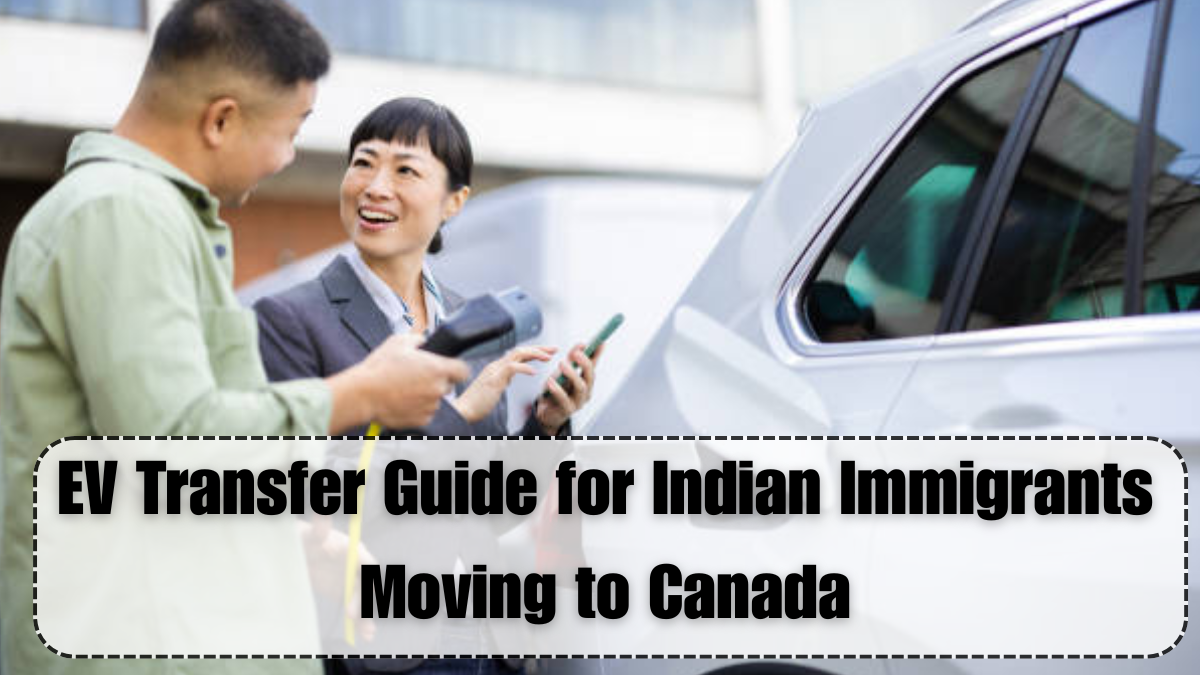For Indian immigrants relocating to Canada in 2025, one of the most common questions involves whether or not they can bring their electric vehicles (EVs) with them. The process can seem overwhelming, but with proper EV documentation for immigrants, vehicle transfer becomes a structured and achievable task.
As electric mobility grows globally, Canada has opened its borders to personal EV imports—provided you comply with all regulatory and safety requirements. This article outlines everything an Indian Canada immigrant needs to know to legally and smoothly transfer an EV, from paperwork to port clearance.

Understanding the Required EV Transfer Process
Before initiating the EV transfer, Indian immigrants must first ensure their electric vehicle meets Canadian safety and emission standards. Canada only permits imports of vehicles that align with their Motor Vehicle Safety Act. The most important step is acquiring a Vehicle Import Form – Form 1 and verifying that the model is approved for Canadian roads.
In addition, all documentation must be translated into English or French. Key documents include:
-
Vehicle registration certificate (RC)
-
Purchase invoice and ownership proof
-
Vehicle Insurance Certificate from India
-
PUC (Pollution Under Control) Certificate (although EVs are exempt, this may still be requested)
-
Bill of lading and shipping invoice
-
Letter of compliance from the manufacturer
These documents form the core of EV documentation for immigrants, which is thoroughly verified at both Indian and Canadian ports.
Inspection, Compliance, and Clearance in Canada
Once the vehicle lands in Canada, it is subject to inspection by the Registrar of Imported Vehicles (RIV). Indian Canada immigrants must pay the RIV fee and schedule an inspection appointment at an authorized centre. This inspection checks for side-marker lights, metric speedometers, child restraint systems, and overall build compliance.
If the EV passes inspection, it will be cleared for road use. You’ll then be issued an inspection certificate that enables the vehicle to be registered with your provincial or territorial licensing authority. This stage finalizes your EV transfer into the Canadian transport system.
Cost Breakdown and Import Taxation
While Canada supports green transport, vehicle importation involves certain duties and charges. Depending on your immigration status and the value of your EV, you may be eligible for a tax waiver under the personal effects exemption if you’re moving permanently.
Here’s a typical cost breakdown for EV documentation for immigrants:
| Cost Component | Estimated Range (CAD) |
|---|---|
| Shipping and Freight | $1,200 – $2,000 |
| RIV Inspection Fee | $325 |
| Duty/Tax (if not exempt) | 6.1% – 8.5% of vehicle value |
| Customs Brokerage and Handling | $100 – $300 |
| Provincial Registration & License Fee | Varies by province ($100–$250) |
Make sure to retain original purchase receipts and translated vehicle specs to claim any exemptions or discounts available to Canada immigrants.
Final Registration and Driving Legally
After your EV clears customs and passes all inspections, it needs to be registered under the provincial transport authority—such as Service Ontario or SAAQ (in Quebec). Provide your import docs, insurance papers, and inspection certificates during the application.
Once registered, you’ll receive license plates and registration documents, officially making your EV street-legal in Canada. It’s also advised to get winter tires if you’re settling in colder provinces. With your EV documentation for immigrants completed, you can now enjoy clean, sustainable driving in your new country.
Tips for a Hassle-Free EV Transfer Experience
-
Ship the EV with a reliable international logistics provider with experience in EV transfer.
-
Translate all papers before reaching Canada.
-
Keep digital and hard copies of import docs.
-
Confirm manufacturer compliance letters before shipping.
-
Check provincial rules—Quebec and British Columbia have the most EV-friendly policies.
FAQs
What are the basic EV documentation requirements for immigrants?
The EV documentation for immigrants includes RC, insurance papers, invoice, pollution certificate, shipping bills, and manufacturer compliance letters.
Can every EV model from India be transferred to Canada?
No. The EV must meet Canadian safety standards. Not all Indian models are permitted, so verify compliance before your EV transfer.
Is the RIV inspection mandatory for all vehicles?
Yes. Every imported vehicle, including EVs, must undergo a mandatory RIV inspection unless exempt as part of a diplomatic or military transfer for Canada immigrants.
Are immigrants required to pay import duties on EVs?
Possibly not. Permanent Canada immigrants may be exempt under the personal effects rule. Always check with Canadian Border Services and carry proper import docs.
How long does it take to complete the EV transfer process?
The process—from shipping to final registration—usually takes 4 to 8 weeks, depending on documentation accuracy and EV documentation for immigrants.
Click here to know more.
